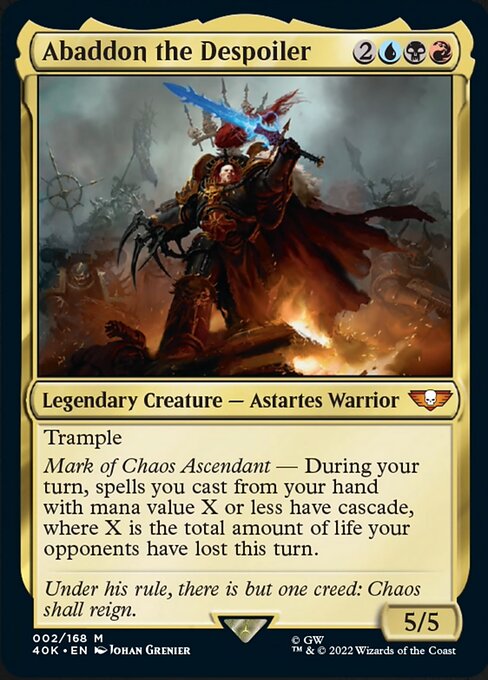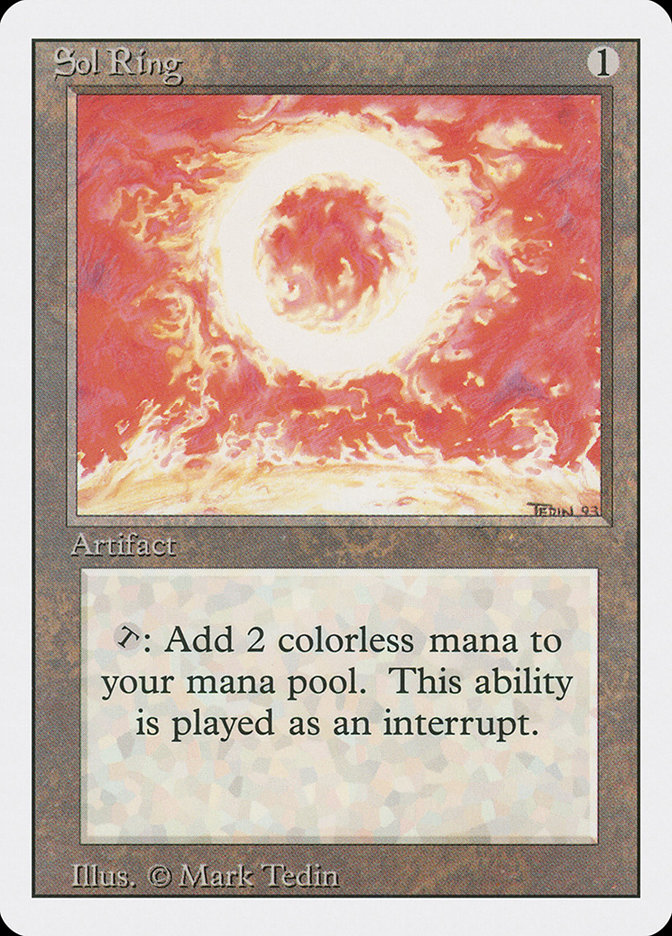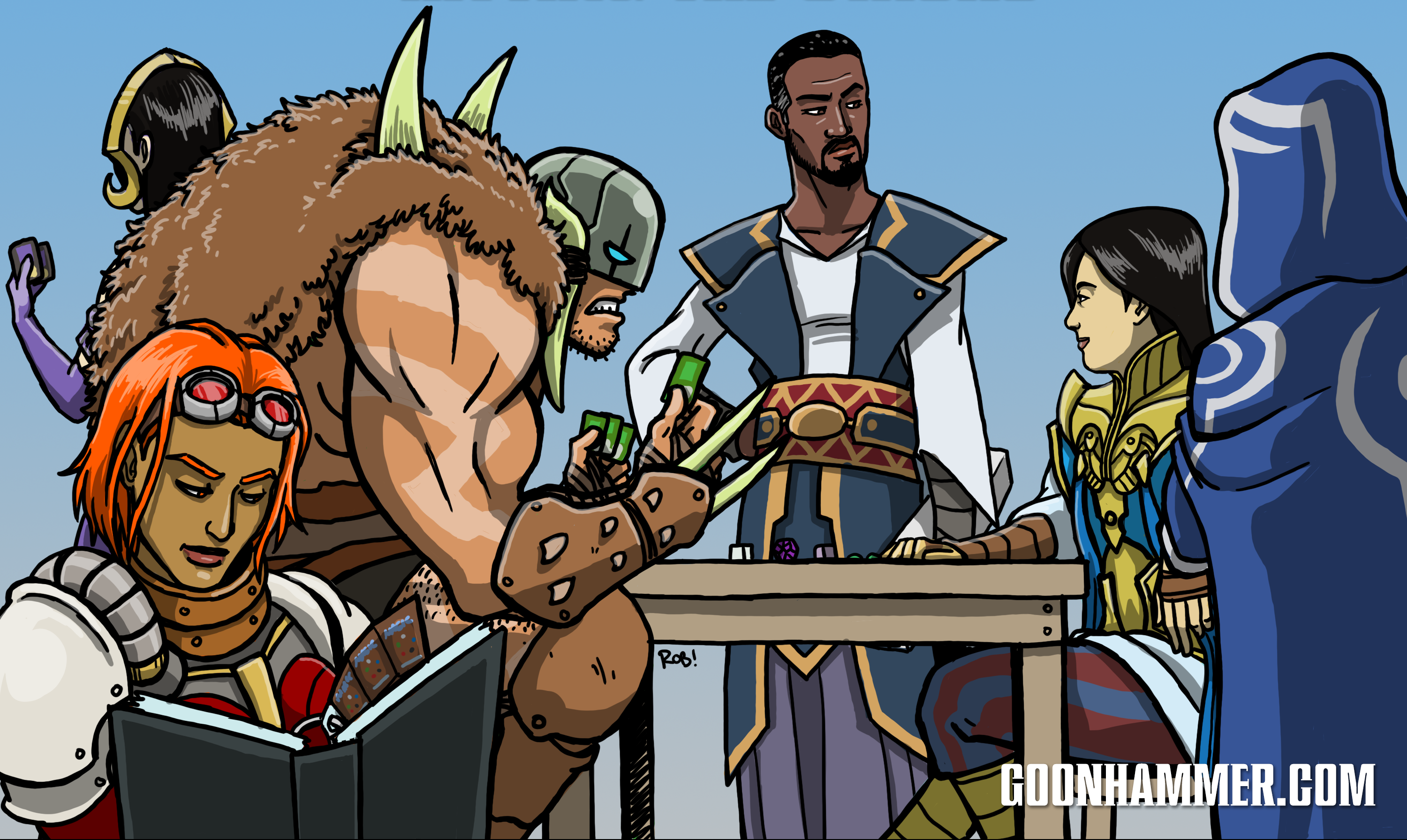Hi everyone! This week, we wanted to take a break from our regular magic coverage to talk about something many new players ask when it comes to Commander: “Where do I even start?” The intention of this guide is to act as educated suggestions to those looking to get into the wonderful game of Magic via the Commander format: currently, Magic’s most popular way to play.
I should also open with a quick preface: this guide is going to assume you already have a basic understanding of the very basics of Magic as well as the core rules and terminology. If you aren’t, there are tons of resources able to teach you in a much better format than I can today. My suggestion is this video by Tolarian Community College, which is one I’ve personally shown others interested in learning, but you’ll find plenty of options online. Don’t need to reinvent the wheel if others have already done it better.
With that out of the way, let’s get in to it.
Alright, I’m interested. What is Commander?
If you’re new to the scene, Commander is a “Format” of Magic the Gathering. Think of “Playing Magic” as like saying “Playing Cards,” whereas “Playing Commander” is like saying “Playing Poker.” Magic is a core set of game rules that can be played in a variety of ways, but today we’re going to cover its premier multiplayer format.
Commander is designed around playing with 4 players, but the beauty is that you can realistically play with however many people you have on hand. You may hear it also referred to as “EDH,” which stands for Elder Dragon Highlander. It’s the same thing, both are synonymous, that is just an older term from the format’s conception, where it was balanced around a series of creatures known as “Elder Dragons.” Commander is an eternal format, which means that excluding a pool of banned cards, you can use any legal card from Magic’s long running history.
Commander is different from other formats in Magic for a few reasons. First and foremost, it is a 100-cards-per-deck “Highlander” format: this means each deck cannot have duplicate copies of cards; you’re limited to one of each in your deck (with the exception of basic lands). Second, one card of each person’s deck is designated as the Commander: you can select any legendary creature from Magic’s long running history, as well as a few other cards that are designated to be Commanders. As of writing, this is a touch under 1,900 different cards. Needless to say, you have options. When you select a commander, your deck is restricted to only using cards within that commander’s color identity, as well as colorless cards. Color identity is represented by any color that appears on a card, be it mana cost or ability. Basically, if you see a color anywhere on a commander, you can put cards of that color in your deck – for instance, Abaddon here can include Blue, Black, or Red cards.

Why should I play Commander? What makes it appealing?
Commander is unique in that it provides a very fun and diverse experience in a social format that can range anywhere from casual to highly competitive. From a deckbuilding standpoint, you have a pool of over 25,000 cards to choose from, and you never have to worry about your deck rotating or becoming invalid. Some additional points are:
- Accessibility: Commander is a super easy format to pick up, assuming you know the basic rules. Playgroups are easy to find and it doesn’t require a lot of extra “fine print” to get to throwing cards around.
- Multiplayer: Being able to play in groups makes it easy to accommodate to groups regardless of size, be it playing in one big pod or splitting off to smaller sub-groups.
- Diversity: Having so many options in both cards and playstyles, you rarely run into the exact same deck twice. There are lots of opportunities to make your deck unique and feel like it has your own signature spin.
- Support: It’s no secret that Wizards of the Coast is very aware of the popularity of Commander, and they throw bones to the format in almost every set, even including sets and products dedicated specifically to it.
- Low Barrier to Entry: One of the awesome parts about Commander is that you can get started with everything you need to play for pretty cheap, and budget deckbuilding is a sizable community within Commander itself. Many people (myself included) play regularly with decks anywhere from 30-50 dollars, and if you’re crafty you can make decks punch up and really carry their power high above their price point.
That all sounds pretty cool. How does it play?
Compared to traditional 40 or 60 card magic formats, Commander uniquely is a much slower, methodical game. Since you have multiple people to try and eliminate from the game, you can’t always come out of the gate kicking and screaming. Almost every deck takes advantage of Ramp spells, which is a term for cards that will put you farther ahead on mana. This can be getting more lands on board, artifacts that will get you more mana known as Mana Rocks, or even creatures that can tap for mana which are lovingly referred to as Mana Dorks. Since you have multiple players, people tend to also play more effects that can hit multiple people at once, with very common effects that will hit “each opponent” rather than just “target opponent.” Another popular card type is the fabled Board Wipe, also known as a Sweeper or Wrath, which can impact every creature on the board rather than just one or two. Since you play with so many people, it’s sometimes even wise to play Politics and make alliances and deals, although make sure you don’t break them, since that’s a long running unspoken rule of the game and makes you look like a real bum.

From a rules point of view, Commander does have a few knick-knacks. First is the Command Zone: your commander begins the game here. Think of it like an extension of your hand. You can always play your commander at any time you normally could cast the card (so typically, your main phases). Whenever you cast your commander, you raise your “Command Tax,” which increases the cost by 2 colorless mana each time you cast it. This makes it so you can always have access to it and don’t really need to worry about losing it indefinitely, but if you’re not careful it can get costly quick to keep casting it.
In Commander, everyone draws a card on the first turn. We all ball in this household.
In case you Got That Dog in you and want to mulligan your starting hand for something better, you get a free mulligan back to 7 cards.
You start at 40 life instead of 20, which is typically reduced to 30 if you’re feeling brave enough for a 1v1 rage cage.
After you roll for turn, the turn order moves around the table from that point, typically clockwise if you enjoy happiness and kittens.
Also a bit advanced, but priority is passed around as normally in turn order. It’s an easy mistake to make early, but it’s good to remember.
I’m sold. Where do I start from?
First and foremost, check your local game stores or local gaming group pages to see if there are any players in your area. Almost every community has players happy to teach the game to newcomers and often even have decks you can borrow if you want to try-before-you-buy. Even just sitting down and watching some people play can give you a feel for how it plays. Commander does have a variety of complex cards, but the core rules of Magic are simple: you aren’t expected to know and remember every card! Ask questions and don’t be afraid to get some help; every new skill requires a bit of learning.
If you just have a crew of friends that want to get a group going together or don’t have anyone nearby to try the game out, don’t fret. Check out YouTube for tons of awesome Commander related content, there are countless top-notch videos that are well edited and explain lots of the game as they go, which can be a great way to learn and pick up on some new tricks. You can play the game online in a few ways as well: Magic Online is the only fully automated way, but costs money to buy cards. You can still build some solid decks for pretty cheap though, so it can be worth the look if you don’t quite want to check out paper magic. You can also play through some third parties like Untap.io, Tabletop Simulator, and Cockatrice, which are fully manual Board/Card game platforms, but can be nice if you don’t have access to playing locally. I still play online with my friends regularly when we don’t want to take the trek to see one another.
I’m ready to get a paper deck of my own, what are my options?
You’ve got a few choices to get started:
- Preconstructed Commander Decks or “precons” are readily available at most game stores and even some regular retail locations. They aren’t called starter decks for a reason: they’re supplemental products that are designed to re-print cards and introduce new, unique ones in a fun and constructed way, and thus some of them can be niche. That being said, they often have pretty solid value and are a great place to get started, even if that means you’ll be tinkering with the deck after you get it a bit. There are quite a few of these out there, and I’d suggest any of them from the past 1-2 years, as they’ve improved in their cohesiveness compared to older ones, but you’ll be fine with any that you like.
- Budget Decks, purchased by buying singles. This is the option I suggest the most, as you can really find something that suits you well and will be a great starting point. For some resources to find them, I’ll direct you to MTG Goldfish’s Tomer Abramovici (who recently created this compilation of 50 decks under 50 dollars, which I cannot recommend enough) as well as r/BudgetBrews and their respective Discord group, or any “Budget” focused Commander page. You also can use a website called EDHRec (which I’ll touch on shortly) and check any commander’s “Average Budget Deck.” Here is an example of that, although note that this is compiled from a portion of deck data, so this is sometimes not as reliable as a deck that’s tried and true by a creator. Of course, you also have the lovely writers here at the Hammer of Goon, so check out some articles here if you want to read more!
Note: Most budget focused decks will run you anywhere from 30-100 dollars typically, since budget is a bit of a relative term. In general, most people tend to build them around 50 dollars, so I tell people to expect to pay under 60 dollars, which is about the price of a new AAA video game, only this one actually retains its value with time!
Lastly, if you have a big pool of cards you already own, feel free to throw a deck together with those. I would not suggest going out of your way to purchase bulk or sealed product for this purpose, but if you already have the goods and you just want to give the game a test drive, this can be a nice way to do it.
Since you might be reading this from anywhere in the world, I can’t directly suggest a retailer to purchase your cards from, but check out google for “MTG Singles,” there are plenty of retailers worldwide that specialize in making sure you can easily access any cards you need. Your LGS is always a safe bet as well.
You can get going right away with this stuff, but I’d highly suggest going out and grabbing a playmat and sleeves for your cards. Most people would be led to believe this is to protect your cards, which is partially true, but that’s not why I’m suggesting it. I’m telling you because nothing is more annoying than having to pry that blasted piece of cardboard off the stupid gaming table when you start to move things around on the board. Plus, it will make your life a heck of a lot easier when shuffling to have your wizard squares protected with their fun little plastic jackets. The extra 30 bucks for these things will be well worth it, trust me. You’ll want some dice too, but those can just be whatever you have at hand to keep track of things. Commander games get big and crazy at times, so tokens and markers can help keep the game in order.
Sweet, I’m ready to start playing! Do you have any other resources for me?
You bet I do, anonymous reader, you.
- Scryfall.com is a search engine and card database which is super helpful for trying to find cards. Learning the syntax can be super helpful, but even if you’re new you can sometimes just google something like “Commander Green Elves Scryfall” and it’ll give you a pretty solid result. Their advanced search feature can help you narrow it down as well.
- Any deckbuilding website, which is a thousand times easier than just throwing everything on a table and figuring it out. My suggestion is Moxfield, which takes the cake for both deck information and ease of use, but there are others out there like deckstats or archidekt.
- EDHRec, which will be your best friend. This website has everything and anything to do with Commander. You can search through commanders and see what cards are regularly played with them to get a good idea of what you might want to include in your deck. You can search cards to see what commanders they synergize with. You can even search through decks online using that commander and generate automatic deck lists. Truthfully, I rarely build a deck without using this site. They’ve also got some great content coverage and a whippin’ podcast.
- Lastly, a bit of an advanced one, is Commander Spellbook, which is a search engine for combos. This site is a great resource and I actually have contributed a handful of the thousands of combos they have listed. If you want to know more about what combos are and how to use them, I already wrote an article on that. Look at how good I am at foreshadowing. Check that out here!
How do I know what deck is right for me?
This is a topic warranting a whole new article (is this…foreshadowing?), but to tide you over, go through the various Color Pairings, Themes, and Types on EDHREC to get a rough idea of what the different strategies and creature types do. We also have plenty of content that covers these things across many articles, so check out some of those here if you’re hungry for more.
Dang, that’s a lot of stuff you covered, any last words?
Just remember to have fun. Magic is a massive hobby, but when you boil it down, it’s a social event. Be nice, fun, and friendly, and your playgroup will be happy to reciprocate. There’s always more to learn, so dig in and chuck some wizard squares: there’s no better way to learn than playing!


